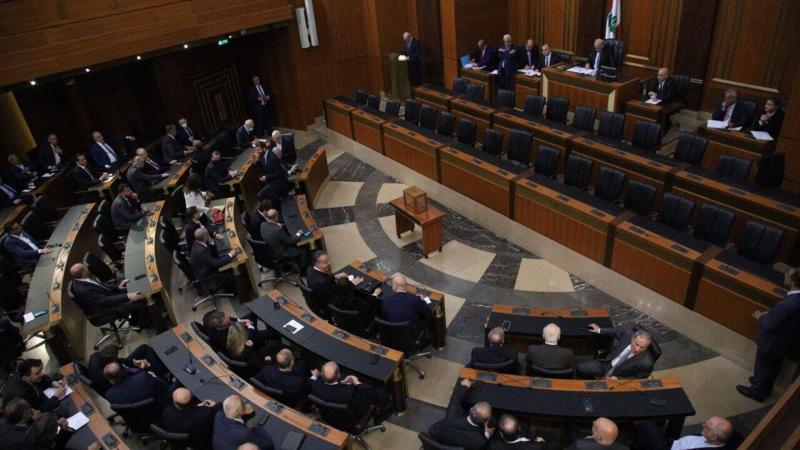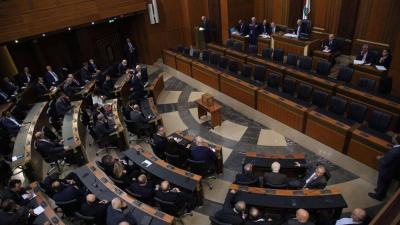"Political selectivity" and the necessities of managing state affairs have driven political blocs to participate in legislative sessions held by the Lebanese parliament, despite the presidential vacuum. The parliament has circumvented the restrictions of "legislative necessity" adopted during this presidential void and has for a time reclaimed its powers under the banner of "the council is its own master," to pass a set of "important laws," relying on the Constitutional Council's opinion that allowed the enactment of laws at all times and in all circumstances, as well as the needs of certain Christian political parties to pass specific laws.
Since the country entered the presidential vacuum on October 31, 2022, with President Michel Aoun's departure from the presidential palace, the Lebanese parliament has successfully held two legislative sessions, during which it approved several urgent laws. However, it failed twice to hold similar sessions due to the boycott by the "Lebanese Forces" and "Free Patriotic Movement" blocs, which disrupted the quorum. Each bloc participated based on its specific calculations; the "Strong Lebanon" bloc, led by MP Gebran Bassil, attended the session extending the terms for municipalities and mayors on April 18, while the "Strong Republic" bloc (Lebanese Forces) boycotted it. Since then, the council has remained inactive until it held a legislative session aimed primarily at extending the term of Army Commander General Joseph Aoun and the heads of security agencies for an additional year, after the "Strong Republic" bloc presented the proposal and attended, thus ensuring the required numerical and constitutional quorum. This session was boycotted by the "Strong Lebanon" bloc, which announced it would challenge the law before the Constitutional Council to annul it.
Parliamentary Speaker Nabih Berri benefitted from the "Lebanese Forces'" desire to pass the law extending the Army Commander's term, adding several projects to the session's agenda—some necessary and others that could be postponed.
In the last session, MP Qassem Hashem, a member of the "Liberation and Development" bloc led by Berri, announced that the council "approved 14 laws, including the extension for military and security leaders, and the social security law, which is a historic demand of the Lebanese." Hashem stressed to "Asharq Al-Awsat" that "the parliament has the absolute right to legislate in all circumstances, as evidenced by the Constitutional Council's decision which rejected the challenge to the municipal extension law, affirming that the council has the right to legislate at all times."
It is true that the parliament succeeded in holding two sessions since the beginning of the presidential vacuum—the first on April 18 and the second in mid-December—but it failed to convene two sessions called by Berri in June and August due to the boycott of the two largest Christian blocs and the absence of constitutional representation (representation of the main sects) which led to a lack of a legal quorum. Hashem noted that "constitutional representation must exist at all times, even with a sitting president and a constitutional government." He remarked, "This session wouldn't have been expected to convene without a tacit agreement on the laws that were approved." He hoped that "the success of the last session would carry over to the presidential election file, which would hasten its pace at the beginning of the current year."
The laws approved by the legislative authority require executive decrees to become effective, and some have warned that these laws will not be implemented as long as there are ministers (from the Free Patriotic Movement) refusing to sign them. However, a ministerial source pointed out that "no one will be able to obstruct these laws," stating to "Asharq Al-Awsat" that "the constitution grants powers of the president to the cabinet collectively, thus it becomes obligatory for the ministers to sign the laws, not to obstruct them." He confirmed that "even if the government refuses to sign the laws, they become effective after a month from being referred to the cabinet and are published in the official gazette," reminding that "the constitutional mechanism that applies to the president (granting him a month to sign laws, and if he does not return them to parliament and does not sign them, they become effective) automatically applies to the government."
The "Strong Republic" bloc considers itself the driving force behind the law extending the Army Commander and heads of security agencies because it was the first to present the draft law and secure the constitutional representation for the last legislative session. However, bloc member MP Ghayath Yzbek stated in a statement to "Asharq Al-Awsat" that "the Lebanese Forces have always rejected legislation in the absence of a president and consider the parliament merely an electoral body." He said: "Because we interpret the constitution positively, we see that there are fundamental milestones that rise to the level of the higher national interest, which makes the matter open for legislative doors, the most important of which is not leaving the army without a commander." He reminded that "the Strong Republic bloc attended the last session and did not discuss any draft law; when the discussion reached the law extending the Army Commander's term and heads of security agencies, we participated and voted to preserve the country's interest and the unity of the military institution," considering that "the formula that opened the door for consensus on extending the Army Commander’s term could open the door for consecutive sessions for electing a president."
There has been a divergence in the interpretations of the laws, with the Lebanese parliament approving 14 laws, the most important being the law extending the Army Commander and heads of security agencies. Constitutional opinions varied regarding urgent laws that cannot tolerate delay and others that do not have an urgency characteristic. Legal and constitutional expert lawyer Said Malek pointed out that according to the provisions of the constitution, particularly Articles 74 and 75, "the parliament turns into an electoral body for the president during the entire period of vacancy in the presidency." However, he emphasized to "Asharq Al-Awsat" that "the participation of some opposition blocs, particularly the Lebanese Forces, in the session extending the Army Commander’s term was primarily in consideration of the higher national interest when they saw that the vacuum in the leadership of the army would have catastrophic consequences." He added: "Based on the saying (necessities allow for prohibitions), the participation did not violate the constitution, but rather was necessary, especially since the Constitutional Council's jurisprudence stated verbatim (when choosing between a constitutional principle and the higher interest of the country, we choose the higher interest)."
It seems that the parliament will be approaching legislative sessions this year, thus there are constitutional justifications for the blocs’ participation under the banner of national security considerations. Lawyer Said Malek stated: "When the budget is presented to the parliament, it is supposed to be attended by parliamentary blocs because the budget is linked to social security; no administration can operate correctly without a complete and comprehensive budget; thus, the approval of the budget falls within the higher national interest."
Legal expert and constitutional law professor Adel Yamin provided a different reading of legislative necessity, "which was represented by the technical extension of municipal and elective councils for one year, in which the Free Patriotic Movement participated to avoid the country falling into a crisis regarding the mayors, highlighting the non-essential legislation represented in the extension of the Army Commander." Yamin viewed in a statement to "Asharq Al-Awsat" that "the extension for municipalities and mayors came out of extreme necessity, for if mayors were not extended, the country would encounter a crisis related to marriage, death, and birth documents, civil registration data, and identity cards, which no one can handle on behalf of the mayors." Regarding the extension of the Army Commander, Yamin does not see "any necessity for it, as the law was tailor-made for a person, and the public sector (Army Command) could have continued under the highest-ranking officer." He placed the blame on the Christian parliamentary majority and its political forces for legislating in the absence of a president, considering that President Berri "succeeded in passing an expansive agenda of laws beyond necessity, breaking a tradition that had solidified throughout the past year, taking advantage of the Lebanese Forces' obligation to pass the Army Commander's extension."
Despite the Constitutional Council approving the notion of legislative necessity during its rejection of the challenge to the law extending the municipalities and mayors, indeed giving the parliament the right to legislate under all circumstances, lawyer Yamin reminded that the Constitutional Council "allowed legislation at all times." Still, Yamin called for "not to make it too easy in the absence of a president," considering that the Constitutional Council "contradicted its decision issued in 2005, which stated not to legislate in the presence of a caretaker government."




